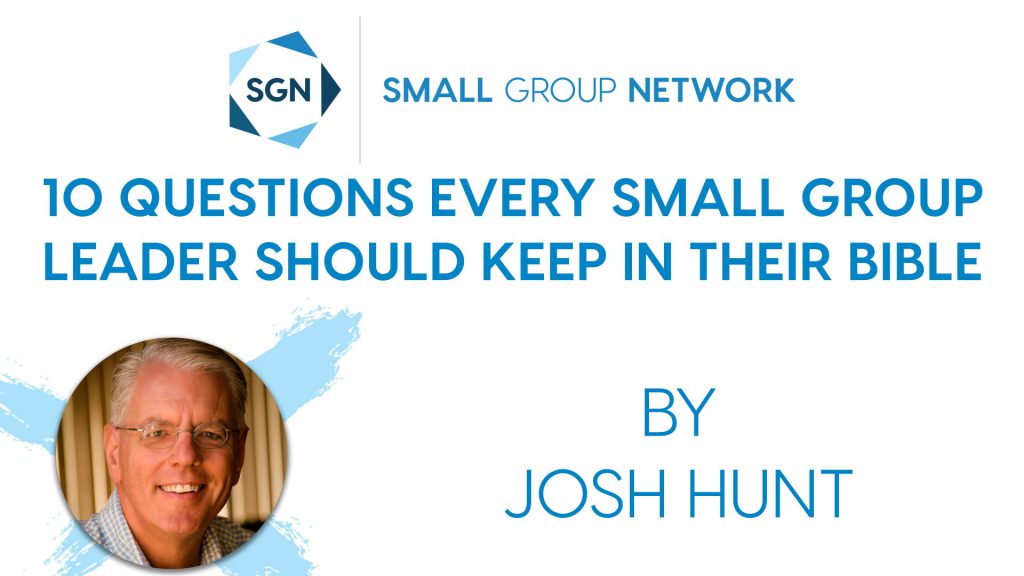
“This is the course I wish I would have had 35 years ago when I started small group ministry.” – Steve Gladen
Presenting our new online training course – “Align!” Align will help you learn the small group ministry essentials. It features…
- 8 HD video session taught by Steve Gladen
- A downloadable workbook
- Lesson discussion questions
- An official Small Group Network completion certificate
- A special gift to help further your Small Group Ministry
Learn more by watching the free course introduction & enroll here!
Picture this. It is 90 minutes before small group. You just got in from mowing the lawn and are in bad need of a shower when you get this text:
So sorry I won’t be able to teach tonight. Can you lead group for me? Thanks!
If this ever happens, you will be glad you have these ten questions tucked in your Bible. They can be used for any Bible passage—kind of like an already-prepared-meal. Simply read this week’s Bible passage and ask these ten questions. Obviously, some will apply better than others to any particular passage.
1. What do we learn about God?
Tozer famously said, “What comes into our minds when we think about God is the most important thing about us.” [1] If we have a big view of God, we have small problems. If we have a small view of God, we have big problems.
2. What do we learn about ourselves?
The Bible teaches that we are saints, servants, accepted, redeemed, beloved, chosen, predestined, special, sons and daughters, saved, God’s masterpiece and a whole lot more. When we come to see ourselves as God sees us, we will come to do what God has called us to.
3. What do we learn about… the topic?
What do we learn about the Devil? What do we learn about the Holy Spirit? What do we learn about Christian Discipleship? What do we learn about Heaven? This question will vary by text.
4. What is the context?
Context is king. Many know the stories of the Bible, but they do not know the story of the Bible. Spend a few minutes exploring how this passage fits into the whole. Look at the chapter before and after.
5. What is the big idea?
We teach so little because we try to teach so much. Good teaching has focus. What Haddon Robinson said of preaching is also true of small group Bible study, “Sermons seldom fail because they have too many ideas; more often they fail because they deal with too many unrelated ideas.”
6. What is the application?
James taught we are to be doers of the Word and not hearers only, and so deceiving ourselves. You don’t deceive yourself by listening to heresy so much as you deceive yourself by listening to the truth and not doing anything about it. This is why, as teachers, we want to teach for application.
7. What is the slogan?
Rick Warren said, “People don’t remember sermons or speeches—they don’t even remember paragraphs. What people remember are simple statements, slogans, and phrases.[2] Try to reduce this week’s teaching to a memorable slogan.
8. What is the benefit if I do?
It is always in our best interest to live the Christian life. God is a good, good Father. It is always good for us to follow God. Highlight this by thinking clearly about the benefits of obedience.
9. What will it cost me if I don’t?
People are motivated by two things: pain and pleasure. Of the two, pain is a slightly greater motivator. Bonhoeffer reminded us of the Cost of Discipleship. Non-discipleship also comes at a high cost.
10. What is the next step?
How can I reduce it to a baby step? The first step is always the most difficult. The journey of a thousand miles begins with a single step. If you can get your people to take one step in the right direction—no matter how small—others will follow.
Print these ten questions and put them in your Bible. There will come a time you will be glad you had them.
[1] A.W. Tozer, The Knowledge of the Holy (HARPERONE, 1978).
[2] Rick Warren, The Purpose Driven Church: Growth without Compromising Your Message and Mission (Grand Rapids, MI: Zondervan, 2007).





